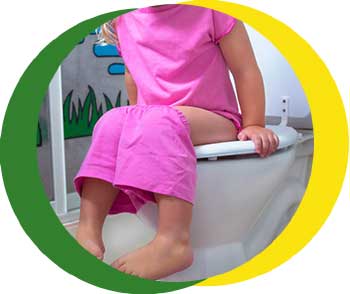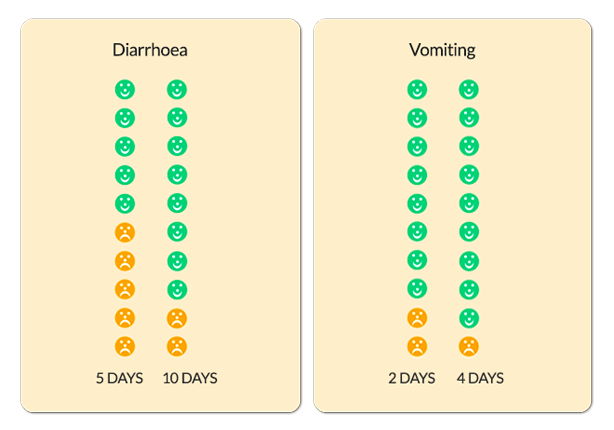Diarrhoea and vomiting

Feeling sick and then vomiting is usually the first sign that your child has a ‘tummy bug’. Diarrhoea tends to occur after your child has started vomiting and means passing frequent watery poos that are offensive in nature.
- Tummy bugs are extremely common in young children and are almost always caused by a virus. They are easily spread, resulting in outbreaks in nurseries and schools
- Babies under 1 year of age (and especially under 6 months of age) are at more risk of becoming dehydrated when they have a tummy bug than older children, which is why it is important to make sure that they are drinking enough.
Operation Ouch – Diarrhoea and vomiting
When should you worry?
If your child has any of the following:
- Becomes pale, mottled and feels abnormally cold to touch
- Going blue around the lips or too breathless to talk / eat or drink
- Becomes extremely agitated, confused or very lethargic (difficult to wake)
- Seems dehydrated (sunken eyes, drowsy or not had many wet nappies)
- Develops a rash that does not disappear with pressure (the ‘Glass Test’)
- Is under 3 months of age with a temperature of 38°C / 100.4°F or above (unless fever in the 48 hours following vaccinations and no other red or amber features)
- Is between 3-6 months of age with a temperature over 39°C
You need urgent help
Go to the nearest Hospital Emergency (A&E) Department or phone 999
If your child has any of the following:
- Seems dehydrated: sunken eyes, drowsy, sunken fontanelle (soft spot on baby’s head) or not had a wee or wet nappy for eight hours
- Has blood in the stool (poo)
- Tummy pain that doesn’t go away
- Has completely stopped drinking or breastfeeding
- Is unable to keep down any fluids during this illness
- Is becoming drowsy (excessively sleepy) or irritable (unable to settle them with toys, TV, food or picking up) – especially if they remain drowsy or irritable despite their fever coming down
- Is 3-6 months of age with a temperature of 39°C / 102.2°F or above (but fever is common in babies up to 2 days after they receive vaccinations)
- Continues to have a fever of 38.0°C / 100.4°F or more for more than 5 days
- If your child has diabetes, monitor their blood sugars closely
- Yellow around the eyes
You need to contact a doctor or nurse today
Please ring your GP surgery or call NHS 111 – dial 111
We recognise that during the current COVID-19 crisis, at peak times, access to a health care professional may be delayed. If symptoms persist for 4 hours or more and you have not been able to speak to either a member of staff from your GP practice or to NHS 111 staff, then consider taking them to your nearest Emergency Department
If none of the above features is present, most children with diarrhoea and / or vomiting can be safely managed at home
(Please note that children younger than 1 year may become dehydrated more quickly. If your child appears otherwise well but you still have concerns, please contact your GP surgery or call NHS 111)
Additional advice is also available to young families for coping with crying of well babies – click here
Self care
Continue providing your child’s care at home. If you are still concerned about your child, call NHS 111 – dial 111
What should you do?
- Avoiding dehydration is important – give your baby/child extra fluids. Give your baby oral rehydration solution (ORS) in between feeds or after each watery stool. Little and often tends to work best – in hospital, babies are given 1 or 2 tablespoons (5-10 mls) of fluid to drink every 5-10 minutes. You can try using a syringe to give fluids to your child. Mixing the contents of the ORS sachet in dilute squash (not “sugar-free” squash) instead of water may improve the taste
- Do not stop giving your baby milk. If you are breastfeeding, continue doing so
- Do not worry if your child is not interested in solid food. If they are hungry, offer them plain food such as biscuits, bread, pasta or rice. It is advisable not to give them fizzy drinks as this can make diarrhoea worse
- To avoid spreading the virus, wash your hands with soap and water after changing nappies. Keep toilets clean and don’t share towels
- They should not return to school or any other childcare facility until 48 hours after the last episode of diarrhoea and / or vomiting
- You can get Oral Rehydration Solution from the pharmacy
How long will your child’s symptoms last?
- Vomiting tends to last for 1-2 days, and diarrhoea tends to last for about 5 days
- The charts below show how long diarrhoea and vomiting lasts in children when they have a tummy bug. The faces represent 10 children who have seen their GP with a tummy bug. Green faces are those children who have recovered within that time period.

Where should you seek help?
- If it is non-urgent, speak to your local pharmacist or health visitor.
- If your child has any of the above features, urgently see your GP. For an urgent out-of-hours GP appointment, call NHS 111.
- You should only call 999 or go your nearest A&E department in critical or life threatening situations.

